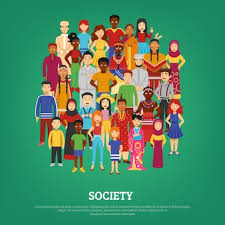The Evolving Role of Society in Modern Times
The Importance of Society in Shaping Our Lives
Society plays a crucial role in shaping the way we think, behave, and interact with others. From our beliefs and values to our social norms and customs, society influences every aspect of our lives.
One of the key functions of society is to provide a sense of belonging and identity. Through shared experiences, traditions, and cultural practices, society helps us form connections with others and establish our place in the world.
Moreover, society serves as a framework for organizing our communities and institutions. Laws, regulations, and social structures are all products of societal norms and values that guide our behavior and interactions.
At the same time, society also shapes our individual development. Our upbringing, education, and social interactions are all influenced by the societal context in which we live. As we navigate through different social environments, we learn to adapt and conform to the expectations of those around us.
Ultimately, society is a dynamic force that constantly evolves and adapts to changing circumstances. By understanding the impact of society on our lives, we can gain valuable insights into ourselves and the world around us.
Understanding Society: Key Questions on Influence, Inequality, and Change
- What is the role of society in shaping individual behavior?
- How does society influence cultural norms and values?
- What are the effects of societal inequalities on communities?
- How does technology impact modern society?
- What is the relationship between government and society?
- How do social movements bring about change in society?
What is the role of society in shaping individual behavior?
The role of society in shaping individual behavior is profound and multifaceted. Society provides a set of norms, values, and expectations that guide how individuals interact with one another and navigate their surroundings. Through socialization processes such as family upbringing, education, media influence, and peer interactions, individuals internalize societal norms and learn to conform to accepted behaviors. Social institutions and structures also play a significant role in shaping individual behavior by providing frameworks for governance, social order, and cultural practices. In essence, society acts as a powerful force that influences the choices, attitudes, and actions of individuals as they strive to fit into the larger social fabric.
How does society influence cultural norms and values?
Society plays a fundamental role in shaping cultural norms and values by providing a framework for shared beliefs, behaviors, and traditions. Through social interactions, institutions, and historical contexts, society influences the development and perpetuation of cultural norms. These norms are often reinforced through socialization processes, such as education, family dynamics, media influence, and peer relationships. As individuals navigate within their societal structures, they internalize these norms and values, contributing to the cohesion and stability of the cultural fabric. Society acts as a collective force that guides and regulates behavior, shaping the way individuals perceive themselves and others within their cultural context.
What are the effects of societal inequalities on communities?
Societal inequalities have profound effects on communities, creating disparities that impact various aspects of people’s lives. These inequalities can lead to unequal access to resources such as education, healthcare, and employment opportunities, resulting in widening gaps between different social groups. In communities affected by societal inequalities, there may be higher levels of poverty, crime, and social unrest. Moreover, these disparities can perpetuate cycles of disadvantage and limit the overall well-being and potential for growth within the community. Addressing societal inequalities is crucial for fostering a more equitable and inclusive society where all individuals have the opportunity to thrive and contribute positively to their communities.
How does technology impact modern society?
Technology has become an integral part of modern society, profoundly influencing the way we live, work, and interact with one another. The impact of technology on society is far-reaching, revolutionizing various aspects of our daily lives. From communication and transportation to healthcare and education, technology has brought about unprecedented advancements and efficiencies. While it has connected people across the globe and facilitated access to information, it has also raised concerns about privacy, social isolation, and job displacement. As technology continues to evolve at a rapid pace, its effects on modern society will continue to shape our future in profound ways.
What is the relationship between government and society?
The relationship between government and society is a complex and interdependent one, characterized by a mutual exchange of power, responsibility, and influence. Governments are established by societies to provide structure, governance, and services to ensure the well-being and security of its citizens. In turn, society grants authority to the government through democratic processes, entrusting it with the task of making decisions that reflect the collective interests and values of the population. This dynamic relationship requires transparency, accountability, and active participation from both sides to maintain a balance of power and promote the common good. Through laws, policies, and social programs, governments shape the fabric of society while being shaped by the needs and aspirations of its people.
How do social movements bring about change in society?
Social movements play a crucial role in driving change within society by mobilizing individuals around shared goals and values. These movements often emerge in response to perceived injustices, inequalities, or societal issues that require attention and action. Through collective efforts, social movements raise awareness, challenge existing power structures, and advocate for reforms or policy changes. By organizing protests, campaigns, and grassroots initiatives, social movements amplify marginalized voices, influence public opinion, and push for systemic transformations. Their ability to mobilize people from diverse backgrounds and inspire collective action makes social movements a powerful catalyst for driving positive change and shaping the future of society.

